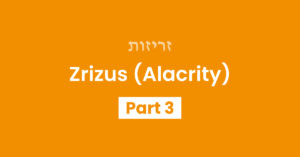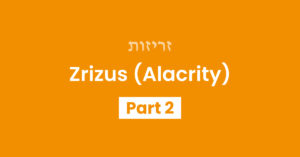What name would you use to describe yourself?
The Midrash1 tells us that after Hashem created the world, He asked Adam HaRishon to give a name to every animal. Adam named all the animals – the camel, goat, ox, horse, and donkey. Finally, Hashem asked Adam: “What should be YOUR name?”
Adam answered: “I should be called ‘Adam’because I was created from the Adamah (earth).”
Adam answered: “I should be called ‘Adam’because I was created from the Adamah (earth).”
We’re so used to hearing the name “Adam” that it sounds normal by now. But if you really think about it, it’s a pretty strange name. Would you choose to call yourself “Earth” or “Dirt”? A human being is so much more than plain earth! Why didn’t Adam call himself “Neshama” (soul) or “Speaking creature” or something that reflected his unique qualities as a human being?
Why on earth (excuse the pun!) did Adam call himself “From the Earth”?
The Mesilas Yesharim2 explains that since man was created from the earth, his nature is to be “earthy.” Unlike air, the earth is heavy and gravity pulls it down. We all have this “earthy” feeling embedded in our nature – we call it the feeling of laziness. It’s the heavy, tired feeling that makes it hard to get out of bed in the morning, get up to wash netilas yadayim, or push ourselves to finish tasks we’ve been procrastinating about. These struggles all come from our earthy, heavy nature that pulls us down.
Adam named himself “from the Earth” because he understood that man’s essential life mission is to overcome his earthy, heavy nature so that he can do mitzvos and fulfill Hashem’s will.3
Adam named himself “from the Earth” because he understood that man’s essential life mission is to overcome his earthy, heavy nature.
If we give in to our earthy, heavy nature, we will have a hard time pushing ourselves to get up and do mitzvos.
But if this earthiness is ingrained in our nature, How can we possibly overcome it?
Overcoming Our Nature
Imagine you are lying in bed, feeling very tired. What’s going to get you to wake up?
Did you ever have a time when you were so eager to start your day that you nearly jumped out of bed? What made you do it?
The answer is that the way to overcome our natural laziness is to focus on WHY we are motivated to get up and go, rather than focusing on the effort we we will need to invest in the process. When you know you have a birthday party coming up later in the day, it’s easy to jump out of bed because you’re thinking about how much fun it will be. When you focus on how much you love your friend, its easier to jump up and help them out.
The trick therefore to doing mitzvos with eagerness is to focus on WHY you want to do the mitzvah. The more you feel eager to do a mitzvah, the easier it will be to jump up and do it.
Focus on WHY you want to do the mitzvah.
This middah of doing mitzvos quickly and completely is called Zrizus, often translated as “alacrity.”
Zrizus and the Holiday of Pesach
This midda of doing mitzvos with zrizus is not just a nice thing to do – it’s actually a very essential component in our Avodas Hashem. In fact, it is closely related to the upcoming holiday of Pesach.
Chazal say4: “When a mitzvah comes your way, don’t ‘let it rise’ like chametz.” What does that mean?
Just as we are not allowed to let matzah rise for more than 18 minutes lest it become chametz, Chazal teach us that we should not let mitzvos lie around for too long before doing them. Imagine that you asked your friend to do you a favor. If they do the favor right away, it shows how much they care about you and that they’re eager to please you. But if they delay helping you out and keep pushing it off, you begin to wonder how much they really care. Similarly, when we do mitzvos with zrizus, it shows Hashem how eager we are to do His Will.
When we do mitzvos with zrizus, it shows Hashem how eager we are to do His Will.
The Sifsei Chaim5 explains that the Pesach season is a special time of year for working on zrizus. On Pesach, we celebrate that we left Egypt in order to accept the Torah and become Hashem’s servants. It is therefore befitting that our actions during this time period should reflect the fac that we are eager and happy to do Hashem’s will.
This month, let’s work on developing that inner sense of eagerness, and practice acting in a way that demonstrates our eagerness to do mitzvos.
Sources: [1] Bereishis Rabbah 17:4; [2] Mesilas Yesharim Chapter 6; [3] Sifsei Chaim Moadim Vol. II. pg. 348; [4] Mechilta on Shemos 12:7; [5] Sifsei Chaim Moadim Vol. II. pg. 345
Your Challenge
Do a mitzvah immediately, as soon as you have the opportunity to do it.
FOR EXAMPLE:
- After waking up in the morning, say Modeh Ani immediately.
- After you are done eating lunch, say a brachah acharona immediately.
- After leaving the restroom, say Asher Yatzar right away.
- Daven Shacharis/Mincha/Maariv at an earlier opportunity, rather than waiting until the last minute.
- Go visit that sick person today, or make that phone call to cheer up your friend who you know can really use it.
- Give your maaser now rather than waiting until the end of the year.
- Start cleaning for Pesach!
Torah Questions
- The Midrash teaches that when Bilam woke up early to curse the Jewish people, Hashem said: “Wicked one! Avraham already acted with zrizus before you [by waking up early to do a mitzvah]!” When did Avraham demonstrate his eagerness to fulfill a mitzvah by waking up early? (See Bereishis 22)
- About whom is it said: “She hurried and filled her pitcher” (Bereishis 24:20)?
- Why was she filling her pitcher?
- Which group of Jewish men are known as “zrizim”? (See Eiruvin 103a)
- Which passuk in Tehillim Chapter 119 shows that Dovid HaMelech did mitzvos with zrizus – he hurried and did not delay in fulfilling them?
- It says in Sefer Yechezkel (1:14) that the “Chayos” (literally “animals” – but here it refers to the angels) rush to do Hashem’s will. Which word is used to describe how quickly they rush? What does it look like when they rush? (See Metzudas Tziyon there)
- The Mesilas Yesharim based his sefer on a Gemara (Avodah Zara 20b) which outlines a step-by-step process for growth. Which step comes before zrizus, and which step comes after zrisus?
Questions to Ponder
- Can you remember a time in your life when you were very eager to do a mitzvah, and did it quickly?
- When you come across an opportunity to do a mitzvah, what thoughts or feelings motivate you to do it quickly?
- As we explained, the more a person values mitzvos and is enthusiastic to fulfill them, the better he will be able to do mitzvos with zrizus. What can you do to increase your enthusiasm and eagerness for mitzvos?
- The Sfas Emes says that zrizus emanates from simcha (happiness). How does that work?



